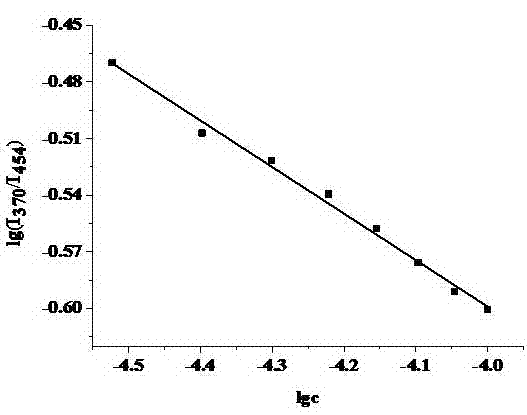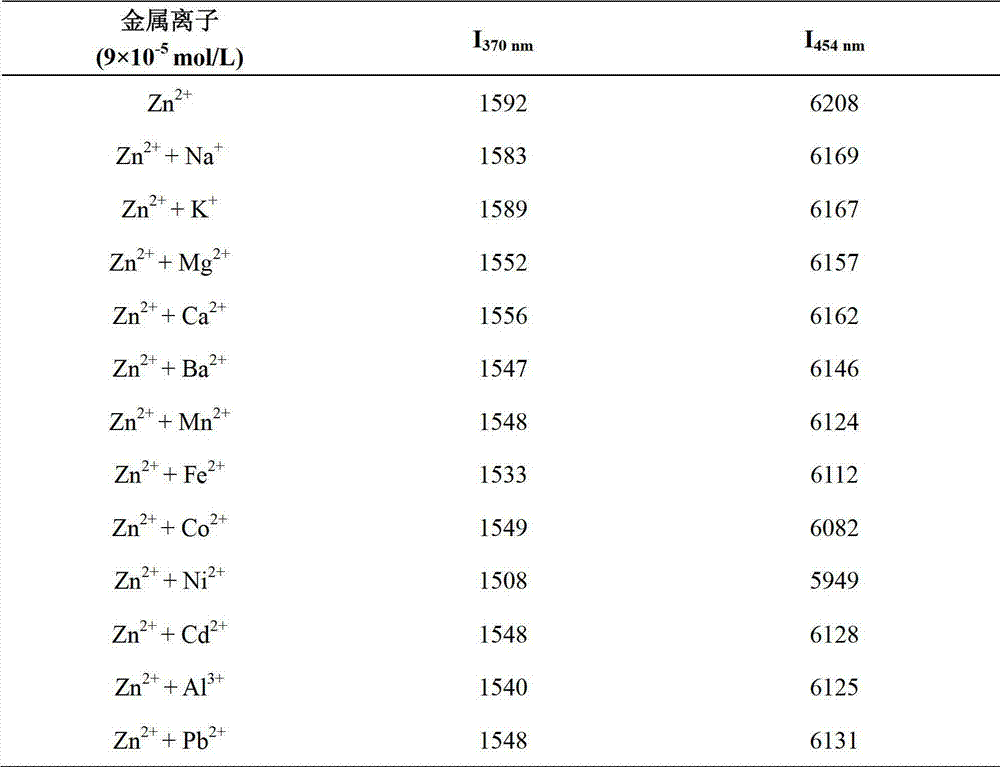Zn<2+> ratiometric fluorescent probe compound and preparation method and use thereof
A technology of ratiometric fluorescent probes and compounds, applied in chemical instruments and methods, fluorescence/phosphorescence, luminescent materials, etc., can solve problems such as limited applications, achieve the effects of increased sensitivity, good reproducibility, and elimination of system errors
- Summary
- Abstract
- Description
- Claims
- Application Information
AI Technical Summary
Problems solved by technology
Method used
Image
Examples
Embodiment 1
[0026] (1) Add 11.3 g of 2-(4'-amino-2'-hydroxyphenyl) benzoxazole, 100 ml of dichloromethane and 10 ml of 20% NaOH aqueous solution into a 250 mL three-necked flask, stirring at 0 ℃ Add 5.7 g of chloroacetyl chloride dropwise, and the dropwise addition will end within 20 minutes;
[0027] (2) Continue to stir for 2 hours at room temperature, stand still for layering, take the water layer and set aside;
[0028] (3) Extract the aqueous layer solution with dichloromethane three times, combine the organic layers, and use 5% HCl and 5% NaHCO for the organic layers respectively. 3 The aqueous solution and water wash to neutral, anhydrous MgSO 4 After drying, filtering, and evaporating the solvent under reduced pressure, 13.9 g of the intermediate compound was obtained with a yield of 92%.
[0029] (4) Dissolve 13.9 g of the intermediate compound in 50 mL of acetonitrile, then add 4.5 g of N-methylimidazole, heat to reflux for 24 h, then distill off the acetonitrile to obtain Zn 2+ Ratio ...
Embodiment 2
[0031] (1) Add 11.3 g of 2-(4'-amino-2'-hydroxyphenyl) benzoxazole, 100 mL of dichloromethane, and 10 mL of 20% NaOH aqueous solution into a 250 mL three-necked flask, and drop them while stirring at 0 ℃. Add 7.4g of chloroacetyl chloride, and the dripping ends within 40 minutes;
[0032] (2) Continue to stir at room temperature for 1 hour, stand still for layering, take the water layer and set aside;
[0033] (3) Extract the aqueous layer solution with dichloromethane three times, combine the organic layers, and use 5% HCl and 5% NaHCO for the organic layers respectively. 3 The aqueous solution and water wash to neutral, anhydrous MgSO 4 After drying, filtering, and evaporating the solvent under reduced pressure, 14.2 g of the intermediate compound was obtained with a yield of 94%.
[0034] (4) Dissolve 14.2 g of the intermediate compound in 50 mL of acetonitrile, then add 3.9 g of N-methylimidazole, heat to reflux for 18 h, remove the acetonitrile by distillation, and obtain Zn 2+ ...
Embodiment 3
[0036] (1) Add 11.3 g of 2-(4'-amino-2'-hydroxyphenyl) benzoxazole, 100 mL of dichloromethane, and 10 mL of 20% NaOH aqueous solution into a 250 mL three-necked flask, and drop them while stirring at 5 ℃. Add 6.3g of chloroacetyl chloride, and the dripping ends within 33 minutes;
[0037] (2) Continue to stir for 2 hours at room temperature, stand still for layering, take the water layer and set aside;
[0038] (3) Extract the aqueous layer solution with dichloromethane three times, combine the organic layers, and use 5% HCl and 5% NaHCO respectively for the organic layers. 3 The aqueous solution and water wash to neutral, anhydrous MgSO 4 After drying, filtering, and evaporating the solvent under reduced pressure, 12.6 g of the intermediate compound was obtained with a yield of 83%.
[0039] (4) Dissolve 12.6g of the intermediate compound in 50 mL of acetonitrile, then add 3.7g of N-methylimidazole, heat to reflux for 24 hours, and then distill off the acetonitrile to obtain Zn 2+ R...
PUM
 Login to View More
Login to View More Abstract
Description
Claims
Application Information
 Login to View More
Login to View More - R&D
- Intellectual Property
- Life Sciences
- Materials
- Tech Scout
- Unparalleled Data Quality
- Higher Quality Content
- 60% Fewer Hallucinations
Browse by: Latest US Patents, China's latest patents, Technical Efficacy Thesaurus, Application Domain, Technology Topic, Popular Technical Reports.
© 2025 PatSnap. All rights reserved.Legal|Privacy policy|Modern Slavery Act Transparency Statement|Sitemap|About US| Contact US: help@patsnap.com



